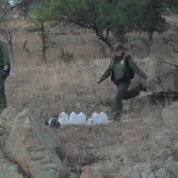Southern Arizona humanitarian-aid workers blame Border Patrol agents for the destruction of water jugs left for border crossers.
Nearly 3,600 water jugs No More Deaths aid workers placed on migration trails near Arivaca from 2012 to 2015 were slashed, stomped on, poured out, dyed, or tampered with, according to a report released Wednesday by the Tucson-based group.
All told, the volunteer aid workers placed 31,600 one-gallon water jugs on remote trails during that period to help border crossers survive the extreme heat and rugged terrain in Southern Arizona.
The group attributed the majority of the destroyed jugs to Border Patrol agents, saying "the culture and policies of the US Border Patrol as a law-enforcement agency both authorize and normalize acts of cruelty against border crossers."
No More Deaths based their conclusion on videos, taken by motion-sensor cameras and an aid worker, of agents kicking water jugs and pouring them onto the ground. The report also said a geographic analysis pointed to Border Patrol agents, as did personal experiences of border crossers and long-term volunteers.
The Border Patrol's policy is to leave humanitarian aid untouched, said Agent Chris Sullivan, a spokesman for the agency's Tucson Sector.
"We do not condone or support the destruction or tampering with humanitarian provisions," Sullivan said.
Agents who violate that policy face corrective action ranging from a verbal reprimand to termination, he said. After an incident more than six years ago, agents were told destroying humanitarian provisions was not condoned. Sullivan said he did not know what corrective action was taken against the agent or whether any other agents had violated the policy since then.
Sullivan said agents "value human life" and dozens of agents are trained as paramedics to help people they find in distress.
The No More Deaths report said aid workers found water jugs destroyed 415 times from 2012 to 2015, which "cannot be dismissed as the misguided behavior of a few bad apples." The report also quoted an unnamed former Border Patrol agent who said agents smashed water bottles and ransacked food caches to expedite the apprehension of border crossers.
The report noted that hunters, hikers, militia groups, local residents, and others could be responsible for destroying water jugs, but the rate of destruction was only slightly higher during hunting season and agents are the only ones besides aid workers and border crossers who regularly access sites where water jugs are placed.
In the Arivaca area, No More Deaths volunteers place water jugs in the Coronado National Forest, Arizona state trust land, and private property. Across those jurisdictions, there was no significant difference in the rate of destruction of water jugs, according to the report.
More than 500 water jugs, not included in the 3,600 tally, showed signs of animal damage.
The new report is the second in a series from No More Deaths and the Coalicion de Derechos Humanos describing deaths and disappearances of border crossers, which the groups say resulted from the Border Patrol's policy of "prevention through deterrence," in reference to the agency's long-standing goal of pushing border crossers into remote and dangerous areas to discourage them from crossing the border illegally.
More than 600 remains of border crossers were received by the Pima County Office of the Medical Examiner from 2012 to 2015, according to medical examiner records compiled by the Arizona Daily Star.
Due to the heat and terrain of the Sonoran Desert, it is impossible to carry enough water for the cross-border trek, which can last days or weeks, the No More Deaths report said. Border crossers used 86 percent of the water placed on trails by aid workers.
Last year, aid workers were banned from the Barry M. Goldwater bombing range and nearby Cabeza Prieta National Wildlife Refuge after leaving water jugs for border crossers on the bombing range, the Arizona Republic reported in December.
A humanitarian aid worker was sentenced in 2009 to one year of probation and after placing water jugs on the Buenos Aires National Wildlife Refuge, which authorities said was littering. The 2008 conviction of another aid worker on similar charges on the wildlife refuge was overturned on appeal in 2010.




